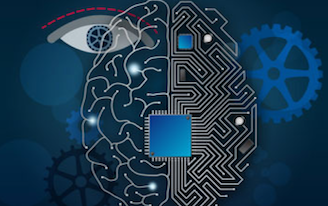The study of intelligence draws upon background in a range of disciplines that include computer science and mathematics, neuroscience, and cognitive science. This page describes courses at Wellesley College that provide relevant training in these disciplines. Wellesley students may also consider courses at MIT or Olin.
Computational Modeling of Intelligent Processes
The creation of intelligent machines requires the formulation of computational models of the representation of knowledge and the processes that use this knowledge to perform intelligent tasks. Courses in areas such as articial intelligence and machine learning provide broad training in relevant modeling techniques. Models are also useful for guiding the empirical study of the neural mechanisms underlying these processes and the cognitive behavior that emerges from these computations. Computer programming skills are essential for implementing and testing models, and for many aspects of empirical work such as running experiments, and collecting and analyzing data. Modeling work is also facilitated by a strong mathematical foundation. The following courses provide relevant training for modeling work:
- CS 111 Computer Programming and Problem Solving
- CS 112 Computation for the Sciences
- CS 232 Artificial Intelligence
- CS 332 Visual Processing by Computer and Biological Vision Systems
Mathematics and Physics:
- MATH 205 Multivariate Calculus
- MATH 206 Linear Algebra
- MATH 215 Mathematics for the Sciences I
- MATH 220 Probability and Elementary Statistics
- PHYS 216 Mathematics for the Sciences II
Neural Basis of Intelligence
Studying the neural mechanisms that underlie intelligence requires an understanding of the functional anatomy of the brain, the structure and function of single neurons and ensembles of neurons, and the empirical methods used to probe the behavior and function of neurons. Empirical studies employ many techniqies for measuring and decoding neural signals, including functional magnetic resonance imaging (fMRI), electroencephalography (EEG), magnetoencephalography (MEG), measurement of the neural spiking activity and local field potentials of single neurons and ensembles of neurons, lesion methods, and microstimulation. Courses in neuroscience introduce these empirical methods and elaborate upon the results and insights learned about the brain mechanisms that underlie intelligence as well as many other important biological functions. The following Neuroscience courses are especially relevant for this study:
- NEUR 100 Brain, Behavior, and Cognition: An Introduction to Neuroscience
- NEUR 200 Neurons, Networks and Behavior
- NEUR 300 Capstone Seminar in Neuroscience
- NEUR 320 Vision and Art
- NEUR 325 Neurobology of Sleep, Learning and Memory
- NEUR 335 Computational Neuroscience
Cognitive Processes Underlying Intelligence
The computational processes that are carried out in the neural circuits of the brain give rise to cognitive behavior that can be studied using methods developed in the fields of psychology, cognitive science, and linguistics. Work in these fields examines many aspects of intelligent behavior, including learning, memory, and decision making, integrating the domains of vision, language, action, planning, and social intelligence, as well as the development of these abilities in childhood. Many relevant courses are offered in Psychology:
- PSYC 205 Statistics
- PSYC 207 Developmental Psychology
- PSYC 215 Memory
- PSYC 216 Psychology of Language
- PSYC 217 Cognition
- PSYC 218 Sensation and Perception
- PSYC 219 Biological Psychology
- PSYC 314R Research Methods in Cognitive Psychology
- PSYC 319 Neuropsychology
- PSYC 328 Seminar: Genes, Brains, and Human Variation
